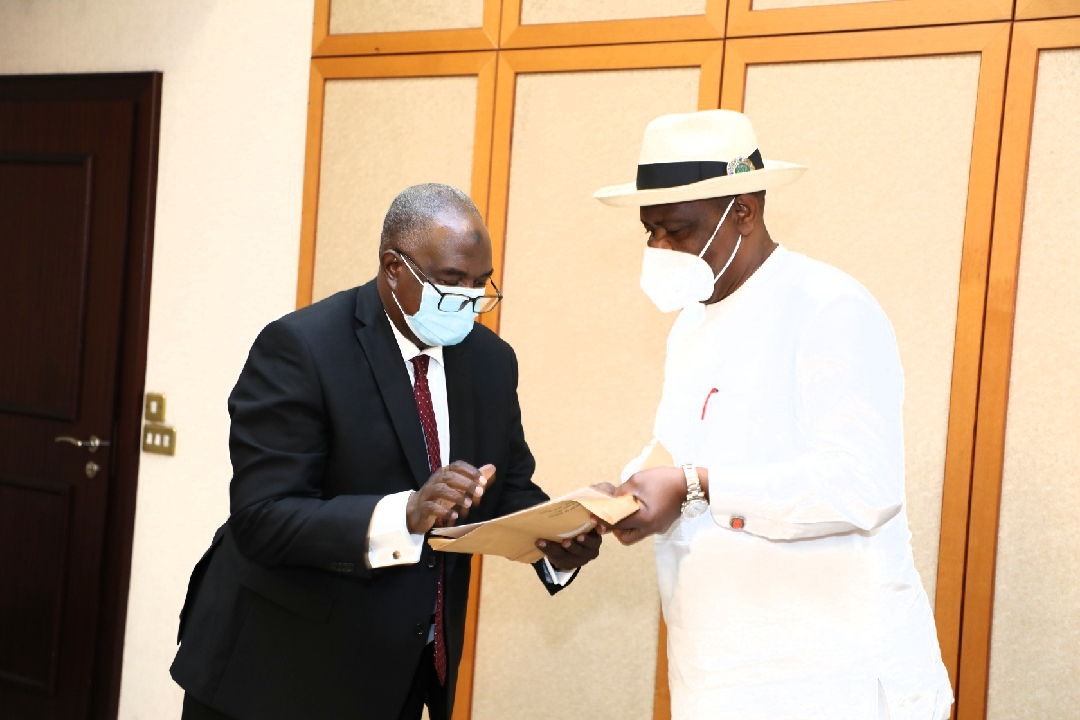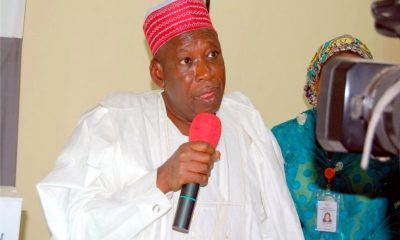News
Nigerian Law School, PH Campus’ll Be Ready In Six Months, Wike Vows

The Rivers State Governor, Chief Nyesom Wike has received a formal letter of approval from the Attorney General of the Federation and Minister of Justice, for the establishment of a Nigerian Law School campus in Port Harcourt.
The letter was presented to the governor by the Director General of the Nigerian Law School, Prof Isa Huyatu Chiroma, at the Government House, Port Harcourt, yesterday.
Wike said it was gratifying that the Council of Legal Education and the Attorney General of the Federation have graciously given approval to the Rivers State Government to assist in the establishment of a Law School in Port Harcourt, an offer which was initially rejected by the immediate past administration in the state.
The governor commended the Attorney General of the Federation and Minister of Justice, Abubakar Malami, SAN, for his statesmanship and commitment to the growth of legal education in Nigeria.
“This is devoid of any political affiliation. I must commend him for this show of sportsmanship, for this show of leadership, that at the end of the day, it is Nigerians and Rivers people that will benefit from the establishment of this campus in Port Harcourt.”
Wike explained that construction work had already commenced at the site approved by the state government for the Port Harcourt campus of the Nigerian Law School.
According to him, the campus will be ready in the next six months and the Certificate of Occupancy for the school is ready.
“The six months that we have given is not six years. Six months is six months. Even if any other project will be suspended, let it be suspended. This project must be finished within six months. And I also urged you to appoint a deputy DG who should move down to Port Harcourt immediately.”
The Rivers State governor explained that some corporate organisations, including banks, have expressed their readiness to build hostels and library in the campus, pending the approval of the authority of the Nigerian Law School.
The governor urged the Nigerian Law School management to graciously immortalise the former Attorney-General and Commissioner for Justice for the Federation, Justice Nabo Bekinbo Graham-Douglas, SAN, by naming the Port Harcourt campus after him.
The Director General of the Nigerian Law School, Prof Isa Huyatu Chiroma, said the process for the establishment of a Law School campus in Port Harcourt started on the June 4, in Yenagoa when Governor Wike threw a challenge that if given an opportunity, Rivers State Government was ready to construct and deliver a new campus of the Nigerian Law School in Port Harcourt within six months.
He explained that afterwards, the Council of Legal Education met and unanimously agreed to accede to the request of the Rivers State Government and this was also endorsed by the Attorney General of the Federation.
The Attorney General of the Federation in this letter to Governor Wike which was read by Chiroma, said immediately he received the letter from the Rivers State Government to assist in the establishment of a new campus in Port Harcourt, his office forwarded same, via Solicitor-General of the Federation and Permanent Secretary for consideration by the Council of Legal Education.
“I am delighted to convey to you the acceptance of your offer by the Council of Legal Education at its meeting held on June 18, 2021. A copy of the approval letter and a draft Memorandum of Understanding to guide or govern the conduct of the partnership project is hereby forwarded to you for your kind consideration and further action.
“While appreciating the kind gestures of the Rivers State Government in the promotion of legal education in Nigeria, please accept the assurances of my best regards and high esteem as always.”
In his remarks, the Rivers State Attorney General and Commissioner for Justice, Prof Zacchaeus Adangor, said the Law School campus in Port Harcourt will stand out as one of the most iconic achievement of the Governor Wike’s administration.
The Chief Judge of Rivers State, Justice Simeon Amadi, commended the Attorney General of the federation and the Council of Legal Education for the approval and assured that the state will construct a befitting campus in Port Harcourt.
Former President of the Nigerian Bar Association, Onueze C.J. Okocha, SAN, said though the new campus is in Port Harcourt, it will be for the benefit of all Nigerians and the legal profession.
The chairman, Nigerian Bar Association (NBA), Port Harcourt branch, Prince Nyekwere applauded the approval, and urged the Federal Government to devolve some of its obligation in the Executive List to the federating States.
News
Bill For Compulsory Counselling For Convicted Corrupt Nigerians Scales Second Reading
A bill to amend the Corrupt Practices and Other Related Offences Act 2000 has passed its second reading in the House of Representatives.
The bill, which mandates compulsory counselling and training for individuals convicted of corruption-related offences, was sponsored by Kayode Akiolu (APC-Lagos) during plenary on Wednesday.
Leading the debate, Mr Akiolu explained that the bill sought to amend Section 67 of the principal act, introducing new provisions that were not part of the original section.
“These additional provisions, found in subsections 2, 3, and 4 of the amendment bill, require judges and magistrates to not only impose imprisonment and/or fines on those convicted of corruption but also mandate a minimum four-week anti-corruption counselling and training.
“The counselling and training will be designed and delivered by the Anti-Corruption Academy of Nigeria (ACAN) and aims to address the psychological factors related to corrupt behaviour,” Mr Akiolu said.
Mr Akiolu emphasised that the training would help reform convicts by addressing their corrupt tendencies and could even transform them into advocates for anti-corruption efforts.
He added that this approach aligned with the reformative aspect of the criminal justice system, which focused on punishment and rehabilitation.
“As per subsection 4, the bill allows magistrates and judges to order convicts to cover the cost of their counselling and training, preventing additional financial burdens on the government,” the lawmaker noted.
Mr Akiolu further argued that if the bill is passed into law, it would strengthen the country’s fight against corruption.
Given the widespread negative impact of corruption, he urged the House to support the bill for the country’s benefit.
Following the debate, Speaker Tajudeen Abbas referred the bill to the relevant committee for further legislative consideration.
News
Judiciary, Media Key Pillars Of Democracy, Says CJN

The Judiciary and the Media are key pillars of democracy, the Chief Justice of Nigeria (CJN), Justice Kudirat Kekere-Ekun, has said.
Kekere-Ekun made this statement in her address at the 2024 National Conference of the National Association of Judiciary Correspondents (NAJUC).
The CJN was represented by Mr Abdulaziz Olumo, the Secretary of the National Judicial Institute (NJI).
“ The judiciary and the media occupy unique and complementary roles in any democratic society.
“ The judiciary serves as the guardian of justice, equity, and the rule of law, the media acts as the conscience of society, disseminating information, shaping public opinion, and ensuring accountability.
“ Together, these institutions provide checks and balances that strengthen the fabric of democracy,” she said.
Quoting Felix Frankfurter, a former U.S. Supreme Court Justice, she said: free press is not to be preferred to an independent judiciary, nor an independent judiciary to a free press. Neither has primacy over the other; both are indispensable to a free society.”
The CJN said this dynamic interdependence between the judiciary and the media presents opportunities and challenges alike.
“ The media is entrusted with the responsibility of informing the public about judicial activities, the judiciary relies on accurate and ethical reportage to enhance public confidence in its work.
“ However, the inherent power of the media to influence public opinion requires careful management, especially when its focus turns to judicial proceedings.
“ The question posed by Robert J.Cordy, a former Associate Justice of the Massachusetts Supreme Judicial Court, is pertinent here: “What happens when the free press turns its sights on the courts-scrutinizing, sensationalizing, and exposing the frailties of the judiciary while questioning its ethical standards and performance?”
“The media’s capacity to shape narratives and perceptions is undeniable” she said.
Quoting Jim Morrison , she said “Whoever controls the media controls the mind.”
According to her, this underscores the immense responsibility placed on journalists to report truthfully, fairly, and objectively.
“ Unfortunately, the commercialisation of news and external influences have led to the rise of sensationalism-a practice that distorts facts, erodes trust, and undermines the very essence of journalism.
“ Sensationalised headlines, such as the infamous 2016 headline “We raided the houses of ‘corrupt, unholy’ judges, says DSS,” can paint a skewed picture of the judiciary and its officers. Such reporting, often devoid of context, compromises the integrity of the justice system and misleads the public.
“ Closely tied to this is the issue of “trial by media,” where premature and often biased media narratives prejudge cases and infringe on the constitutional rights of individuals” she said.
She added that as Mahatma Gandhi rightly observed, “The sole aim of journalism should be service.” It is imperative for media practitioners to remain steadfast in their commitment to truth and objectivity.
To this end, she advised, the National Association of Judiciary Correspondents to take proactive steps to regulate the activities of its members.
“ This is not merely about enforcing rules but about fostering professionalism and safeguarding the credibility of the media.
“ The judiciary and the media must work as partners in progress.
“ To bridge the gap between these institutions, there is a pressing need for constructive engagement and mutual understanding.
“ Courts can provide the media with guidelines on judicial processes, courtroom decorum, and the nuances of court proceedings.
She noted that globally, courts have adopted initiatives to support the media’s role in reporting judicial matters.
For instance, she said the Supreme Court of Dakota’s media guide outlines protocols for courtroom reporting, while the UK ‘s Media Guidance document provides clarity on access and etiquette for journalists.
“ These examples demonstrate how structured collaboration can enhance the quality of judicial reportage.
“ In Nigeria, we can take a cue from these models by developing a comprehensive media guide tailored to our judicial landscape.
“ This initiative, which would involve inputs from NAJUC and judicial stakeholders, would not only enhance media access to courtrooms but also ensure that judicial activities are accurately and responsibly reported” she said.
She advocated that judiciary correspondents must make deliberate efforts to familiarise themselves with the rules and procedures of the courts.
She added that understanding these frameworks will enable journalists to navigate the complexities of judicial proceedings effectively and responsibly.
“ Training programs such as this conference play a crucial role in equipping judiciary correspondents with the knowledge and skills needed to report judicial matters accurately.
“ The theme of this year’s conference, “The Role of Courts in Enforcement of Judgments,” is both timely and significant, as it addresses an aspect of judicial work that is critical to upholding the rule of law and ensuring justice.
“ I commend NAJUC for its commitment to promoting accountability and transparency through its engagements with the judiciary.
“ As I conclude, I must emphasize the importance of credible journalism in strengthening public trust in the judiciary” she said.
She urged judiciary correspondents to prioritise the pursuit of truth and objectivity, resist undue influences, and remain steadfast in their commitment to ethical standards.
She commended the leadership of NAJUC, under the chairmanship of Mr Kayode Lawal, for its efforts in promoting professionalism among judiciary correspondents.
News
Senate Issues Arrest Warrant Against Julius Berger MD Over Road Project

The Senate has issued an arrest warrant for the Managing Director of Julius Berger Nigeria Plc, Dr Peer Lubasch, to appear before its Committee on Works.
The Tide’s source reports that the warrant was for Lubasch to explain the utilisation of funds appropriated for the reconstruction work on Calabar-Odukpani-Itu highway.
The warrant followed the adoption of a motion sponsored by Sen. Osita Ngwu (PDP- Enugu) and co-sponsored by Sen. Asuquo Ekpenyong (APC-Cross River) and Sen. Mpigi Barinada (PDP- Rivers) at plenary in Abuja, yesterday.
Ngwu, in the motion said, that the senate had mandated the committee on works to conduct investigation into the state of road infrastructure across the country.
He said that in furtherance to the investigative hearings, Julius Berger refused to honour invitations to provide details of its role in the Calabar-Odukpani-Itu highway project, in spite of receiving substantial public funds.
He said that this was worrisome, given the alarming discrepancies in performance among contractors on the project, with specific reference to Julius Berger for failing to meet delivery timelines.
Ngwu said it was the constitutional powers of the National Assembly under Sections 8 and 89 of the 1999 Constitution, as amended, to conduct investigations on any person or organisation responsible for administering public funds.
He said that the powers set out in section 6 of the legislative powers and privileges act empowered the Senate to issue warrants of arrest on persons in contempt of its proceedings.
The Tide source reports that the senate further ruled that President of the Senate, Godswill Akpabio, should sign the warrant, mandating the Julius Berger managing director to appear on a date to be communicated.
Akpabio said that the senate’s decision was in line with its constitutional powers under Section 89 of the 1999 Constitution (as amended).
“This senate will not tolerate the continued disregard of its authority.
“The managing director of Julius Berger must appear before the relevant committee, failing which further actions will be taken as prescribed by the constitution.
“The point of order, which was supported by the majority of the senators, highlighted the importance of upholding the integrity of the legislature.
“The senate committee will submit its findings to the National Assembly after the MD’s appearance.
“If there is any further failure to comply, we shall take the necessary steps to ensure respect for the constitution and the rule of law,” Akpabio said.
-
Rivers1 day ago
Ministry Debunks Akpana’s Leadership Of JONAPWD … Sets Stage for Peaceful Election
-

 Editorial23 hours ago
Editorial23 hours agoA New Dawn For Rivers’ Workers
-

 News5 days ago
News5 days agoStakeholder Hails Fubara Over Ekpeye Chieftaincy Title
-

 Business1 day ago
Business1 day agoNADF, NASC Partner To Boost Food Security
-

 Politics22 hours ago
Politics22 hours agoGanduje Gets February 13 Date For Hearing In Alleged Bribery Trial
-

 Maritime5 days ago
Maritime5 days agoMOWCA, NIMET Collaborate On W’Africa Maritime Safety
-
Sports23 hours ago
Football Panacea For Peace, Creates Good Relationship – LG Boss
-
Nation21 hours ago
Senate Summons Wike Over Demolition Of Houses …Set To Investigate FCDA Activities

